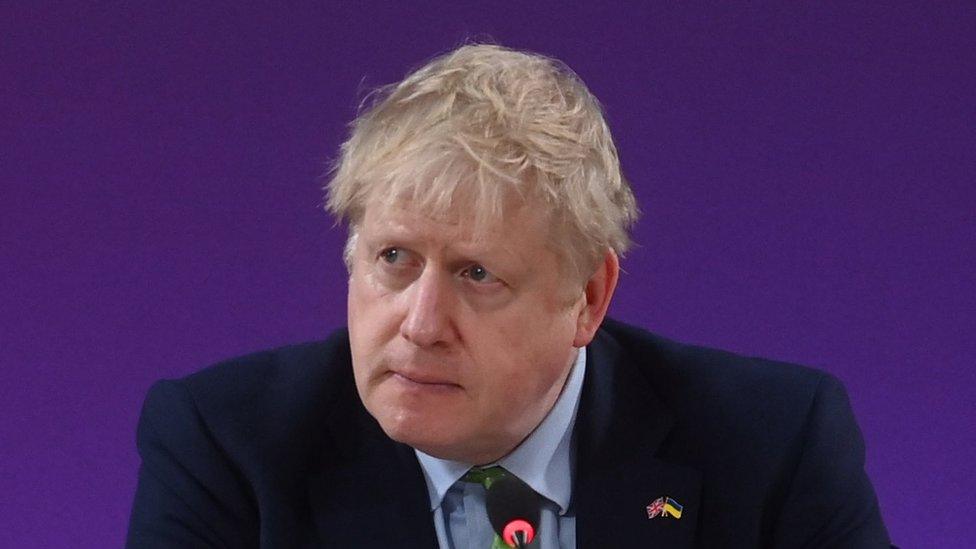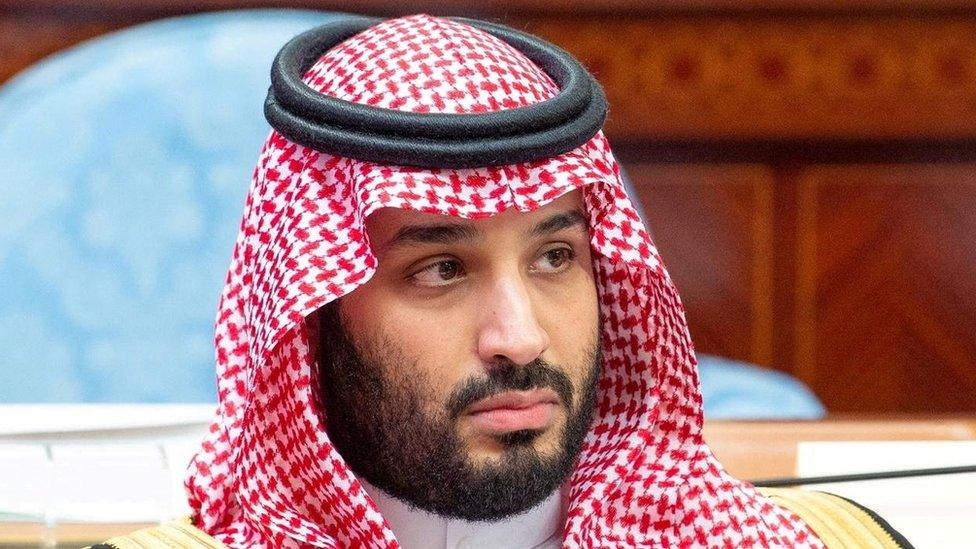Will PM's trip find a way to plug the energy gap?
- Published

Boris Johnson will talk energy with the leaders of Saudi Arabia and the UAE
The military consequences of the conflict of Ukraine are all too visible.
Boris Johnson is now trying to grapple with the economic effects too, arriving in the Middle East on Wednesday morning for a day of diplomacy with the leaders of the United Arab Emirates and Saudi Arabia.
His calculation is that giving up Russian oil and gas is the best way the West can hurt President Putin.
Without a no fly zone, or its own boots on the ground, squeezing Moscow's wallet is the chosen lever for the UK and its allies.
So the prime minister has already vowed to phase out Russian oil, important for diesel supply, by the end of the year.
And the EU's promised to cut the amount of Russian gas it uses by two-thirds.
Those are significant economic restrictions on Moscow already that could be made tighter still.
Sources suggest Boris Johnson is privately trying to push other countries to go further to cut Russia out of their economies.
But crucial to his arguments is evidence that there are reliable replacements for the resources they stand to lose.
The price of that loss is already obvious.
The cost of filling up at home has already surged. The EU depends hugely on Russian gas.
There's no question that a sudden withdrawal of those resources would be a drastic shock to the economy that we would all feel.
So the prime minister is trying to find ways to plug the gap.
That means travelling thousands of miles to talk to the leaders of some of the worlds' biggest energy producers - the United Arab Emirates and Saudi Arabia.
'What's in it for them?'
There is no great hope that a deal will suddenly be done to unleash significant new resources.
One analyst in the region told me: "Riyadh and Abu Dhabi will be thinking, why should they increase production while some European countries are still buying oil and gas from Russia?"
The PM certainly can't be sure that either of his counterparts in the Middle East will want to get involved in the Ukraine conflict, to be seen to "pick a side".
The UAE, for example, abstained in a recent vote at the UN condemning Moscow's actions.
And there have been different messages from the Middle East over whether or not turning the taps on is really something they are willing to do, with ambassadors and ministers sending contradictory signals - you can read more about that here.
But as things stand, a huge breakthrough doesn't seem on the way.
And if the oil producing countries did conclude it might be in their interests to help, they might wonder what's in it for them.
As the analyst suggests, they "may start to be more vocal on these areas, but will expect a quid pro quo".
Any kind of commercial favour in return could bring its own controversy along.

Boris Johnson will meet Saudi Crown Prince Mohammed bin Salman on his visit
And then there is the vexed question about who Boris Johnson is willing to do business with.
Opposition parties and some Conservatives too are uneasy about the government's association with Saudi Arabia and have been for years.
That's more acute after dozens of executions there a few days ago.
Labour leader Sir Keir Starmer said going cap in hand from dictator to dictator is no substitute for an energy strategy.
But for the government, handling the fallout of the conflict in Ukraine means what are described as "hard-headed" decisions, even if it's "distasteful".
With huge diplomatic and economic forces at play, there are no straightforward options.
Disentangling Russia's economy from the West's may seem a diplomatic no-brainer, but the cost and complications of doing so simply can't be ignored.
